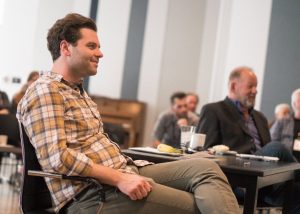
Pictured: William Brown and Nate Burger. Photo by Joe Mazza—Brave Lux.
“What was your first experience with Caryl Churchill or A Number?”
Nate Burger (Bernard)
My first experience with Caryl Churchill was probably in college; we read Top Girls and Cloud Nine and I was totally freaked out by them: both plays were abstract and oblique and challenging in a way I hadn’t encountered and made me feel like I had missed something. I pretty much put Churchill down as something that I wasn’t prepared for or smart enough.
And THEN I got called in to audition for A Number. I was hesitant given my past challenges, but I gave it a read and it blew a moonroof in the top of my head: I think a decade of working almost exclusively on language plays had something to do with it, but I found her lack of direction so exciting and unpatronizing and sharp. Churchill doesn’t give you many answers: she gives you a few clues here and there, but the punctuation is sparse, the thoughts are circular and frayed in places, and the narrative continually leaves you feeling unsteady. She has done what very few playwrights that I can think of outside of Shakespeare dare to do: leave a trail of crumbs and trust that the interpreters are smart enough to pick them up.
William Brown (Salter)
You know, I came to this play in a very unconventional way for me, as I’ve worked as a director for Writers Theatre for several years. My agent called, said Geoff [Button, Associate Artistic Director] had called me in to audition for Robin Witt for A Number. I hadn’t done this type of audition in a while and so I went to prep it and read the play and was dumbstruck. It’s absolutely astonishing; it blew me away with its beauty, insight, horror, comedy and detail, and its complete lack of anything contrived. Then I realized that was my mistake—reading the play— because I knew I had to have the part. And when my agent called to tell me I got it, I immediately asked, “Well, who’s the other guy?” I absolutely hounded them until they finally said it was Nate Burger—Nate Burger! Who’s probably the closest thing I have to a theatrical son. We just truly love each other, and it is great that we get to work together on A Number.
“Is there something that your character experiences in Caryl Churchill’s A Number, or about the play in general, that resonates with you or intersects with your life?”

Pictured: Nate Burger. Photo by Joe Mazza—Brave Lux.
Nate Burger (Bernard)
The thing I really find myself clicking into again and again is the idea of navigating relationships with strangers who also happen to be your family, and family who sometimes can feel like strangers. I have a big family that is spread out, and many of them—including the ones I’m closest to—can often feel unknowable. Particularly when I reflect on the ways that I personally put up barriers around my private life. If I—as a pretty open person—am holding things back from the people around me, why would I expect them not to do the same? And if the people who surround me—those people who helped me construct the singular image of my own personhood—are withholding things that could change the DNA of how I define myself, then how do I know who I really am?
William Brown (Salter)
This play is about fathers and sons, but it is also written by a woman, and the missing mother is an important part of the story. It made me recall a specific life event so viscerally that I had to share it with Robin, our director I was around 10, and my mother was getting her college education and sent me to my grandmother’s when she had to take summer classes. My grandmother lived in a tiny town in North Carolina and was no better at being a grandmother than she was a mother. She would send me across the road to my Uncle George’s house. His wife, my Aunt Anne, had recently died. They had two sons, Bobby and Billy, and I can just see so clearly how it was when I would go over there. There was a sofa and three armchairs, and they would just sit—I don’t even remember the TV being on—and it smelled of coffee, cigarettes and regret. And it had something to do with the woman that was missing. My character in A Number is really affected by that missing woman, and some part of him thinks he deserves whatever he gets. When someone is gone, there is a sense of guilt, and remembering my family, George, Billy and Bobby, was my way into this story and those feelings.
“In an increasingly digital world, why does live theatre still matter?”
Nate Burger (Bernard)
I think live theatre matters specifically because of our increasingly digital world. In the theatre, there really is no opportunity to multitask. The performer is learning from the audience, the audience is learning from the performer, and the space between those two experiences creates a real, vital, and unrepeatable dialogue about where we are and where we might go.

Pictured: William Brown. Photo by Joe Mazza—Brave Lux.
William Brown (Salter)
It’s been almost 11 years since I’ve been an actor on the run of a show, and I finally came back to acting with Writers’ Twelfth Night this season. It was such a wonderful reminder that every night—even on the quietest night—the audience was with us, and they were with each other. Theatre does something that nothing else does—people pay to hear you talk. It’s a conversation between characters, and between the characters and the audience.
When we did student matinees for Twelfth Night, it was just incredible. Even the kids with their arms crossed, who you know are thinking “this has nothing to do with me,” would come along. They would all just inhale it—and they’d be sharing it with 200 people. I don’t know any digital media that can do that to you


No comments yet.